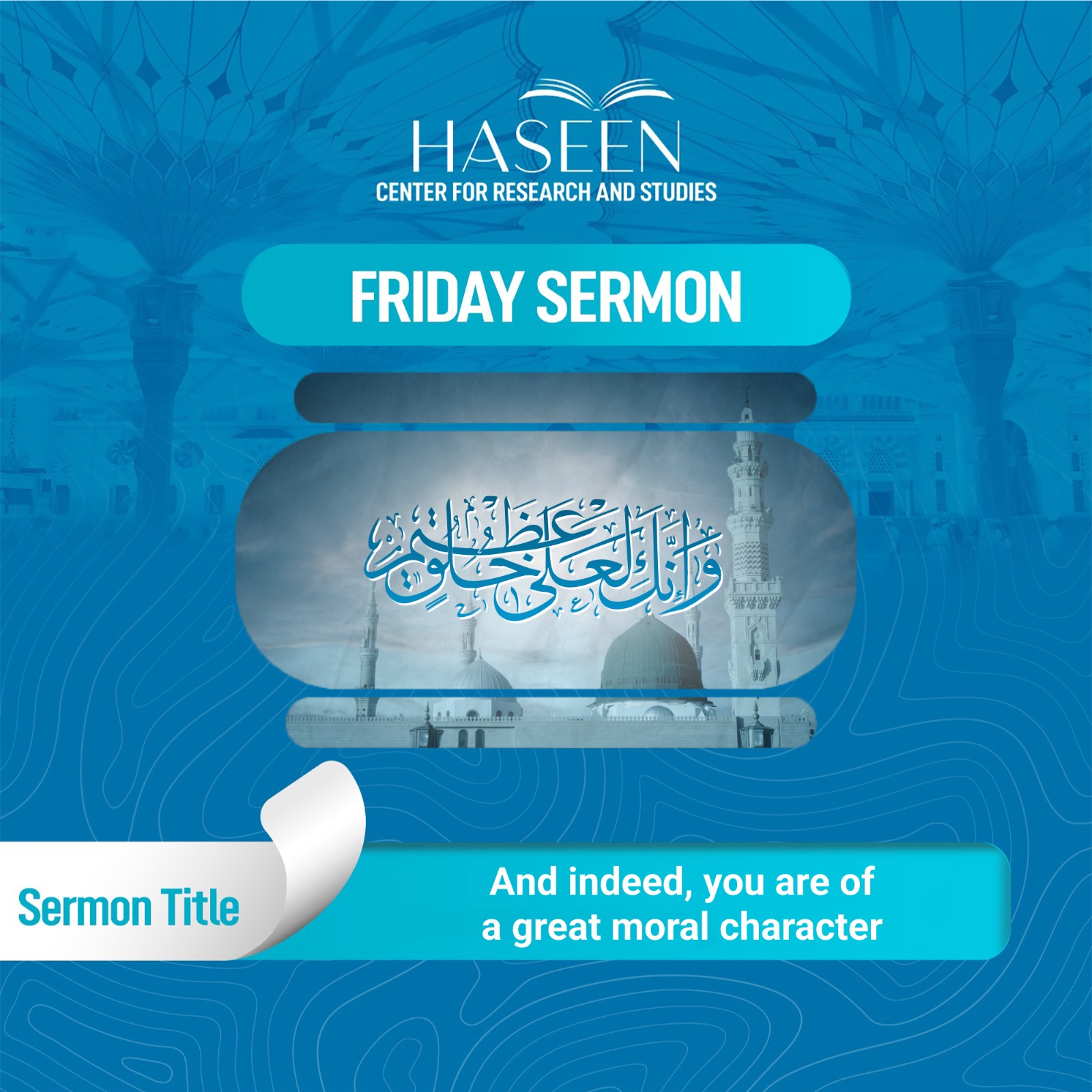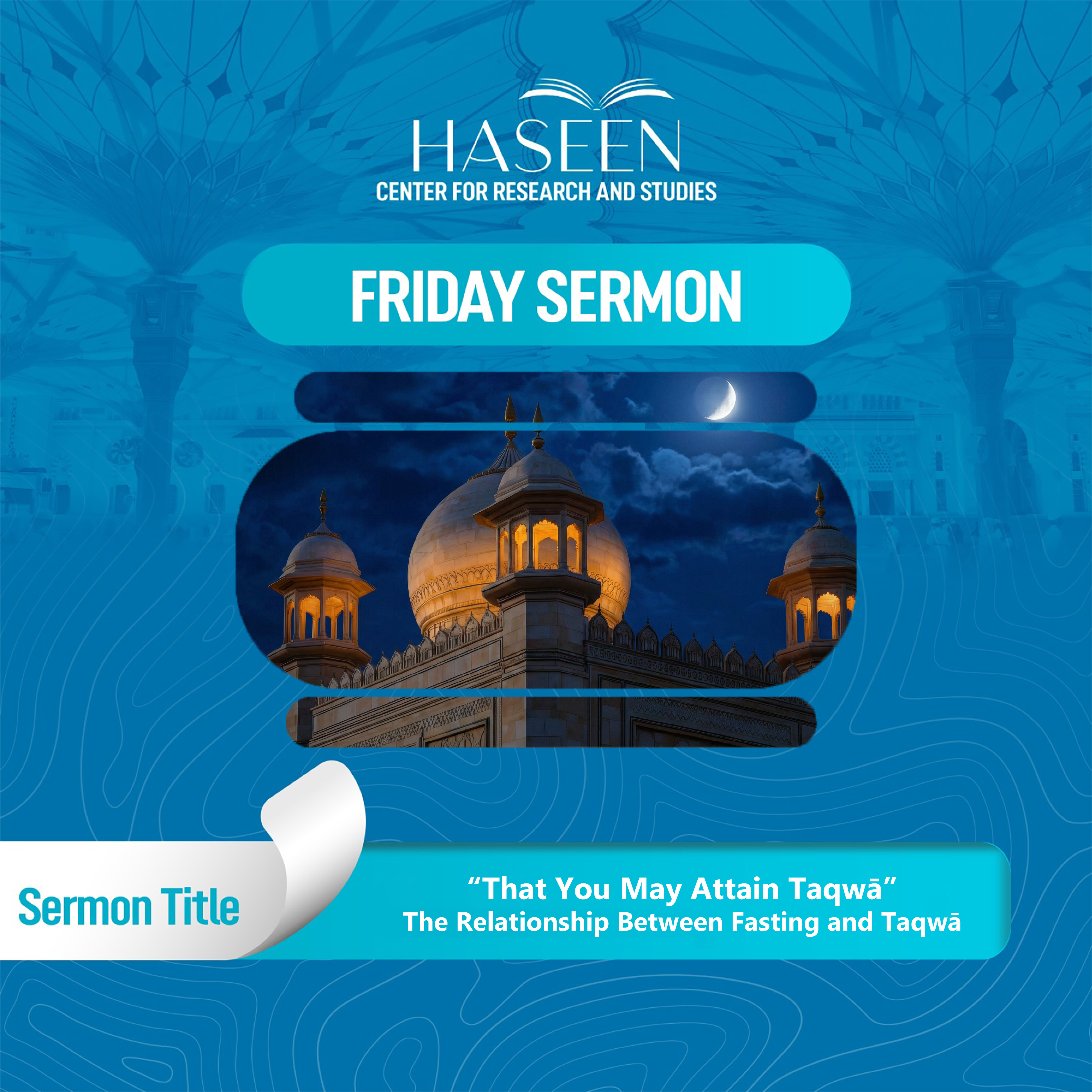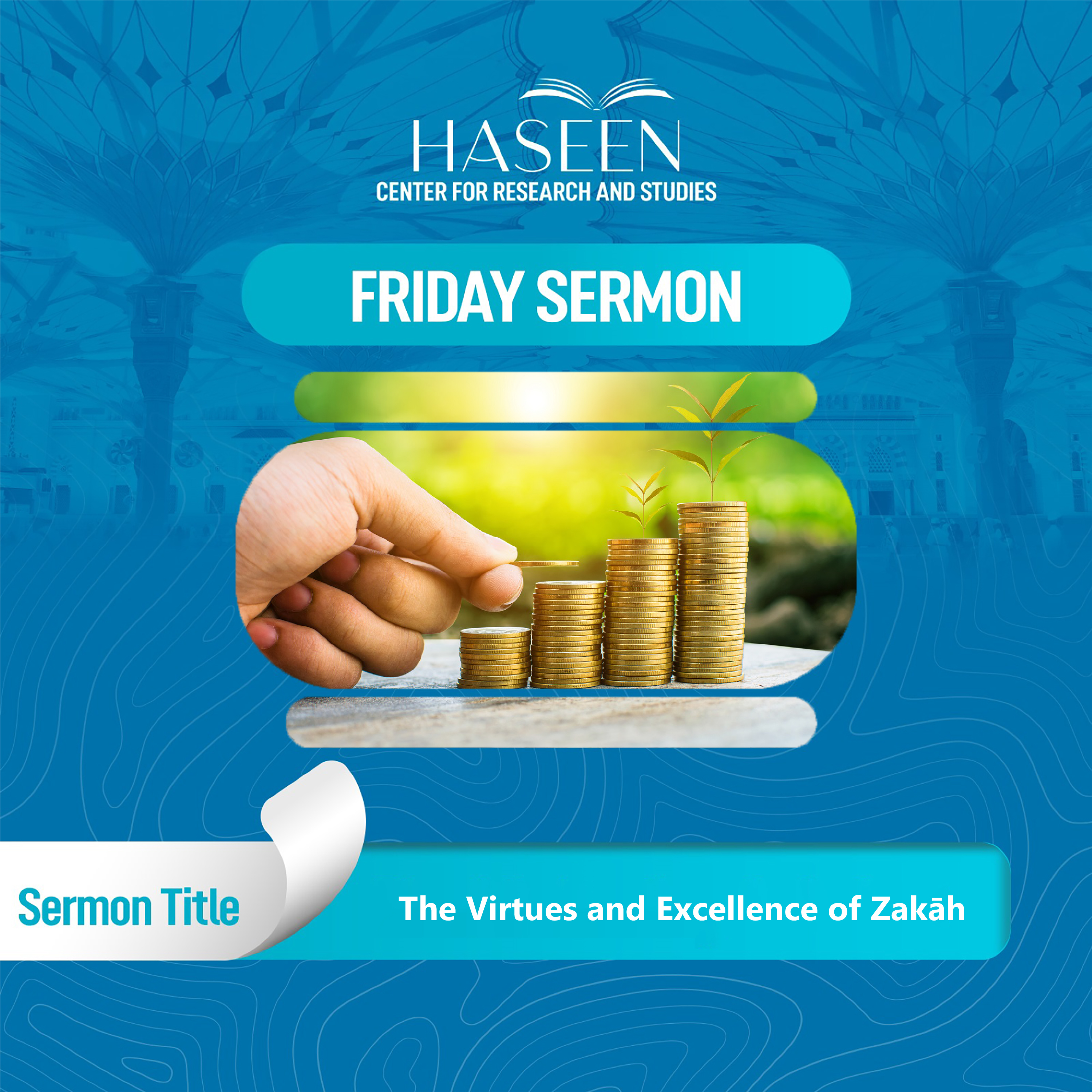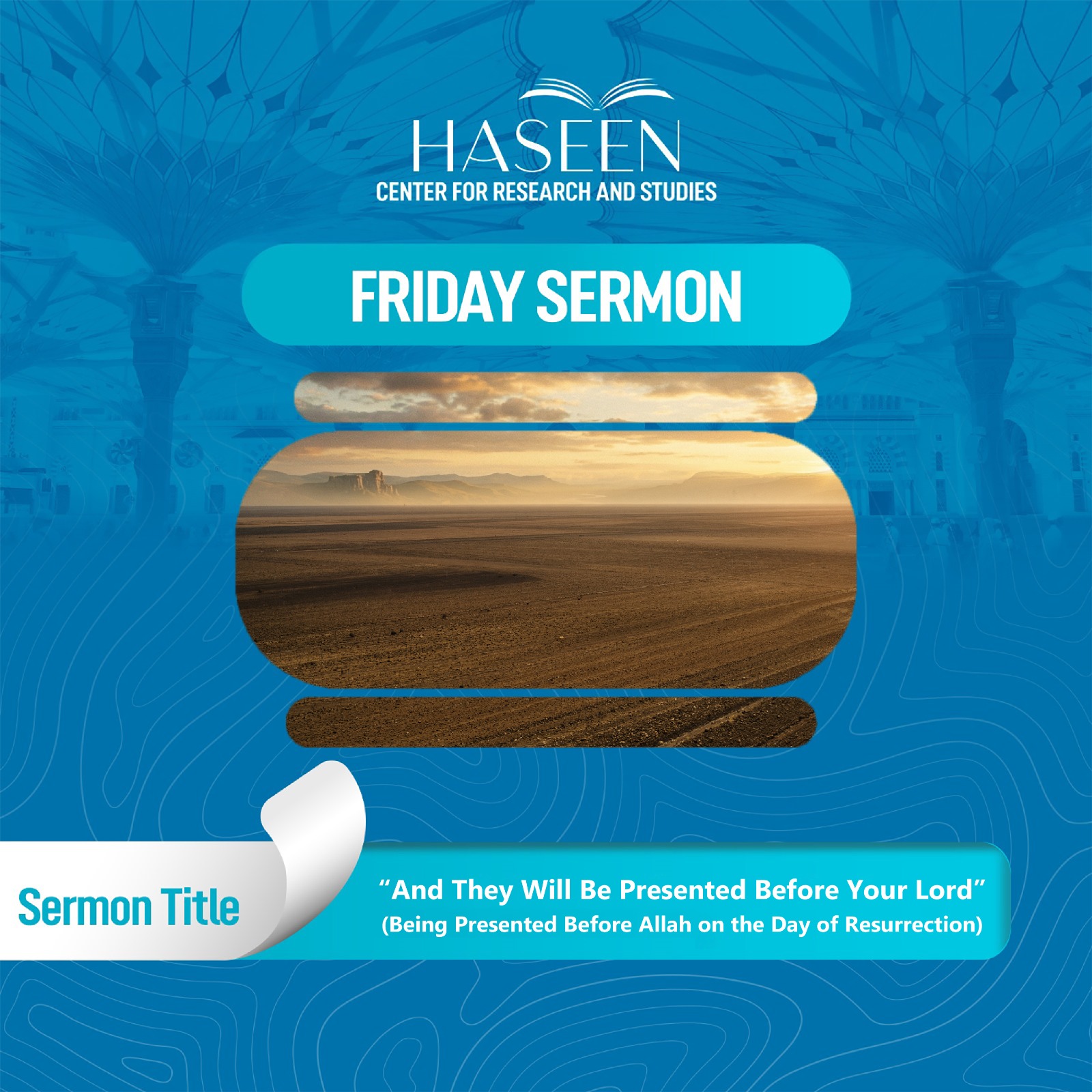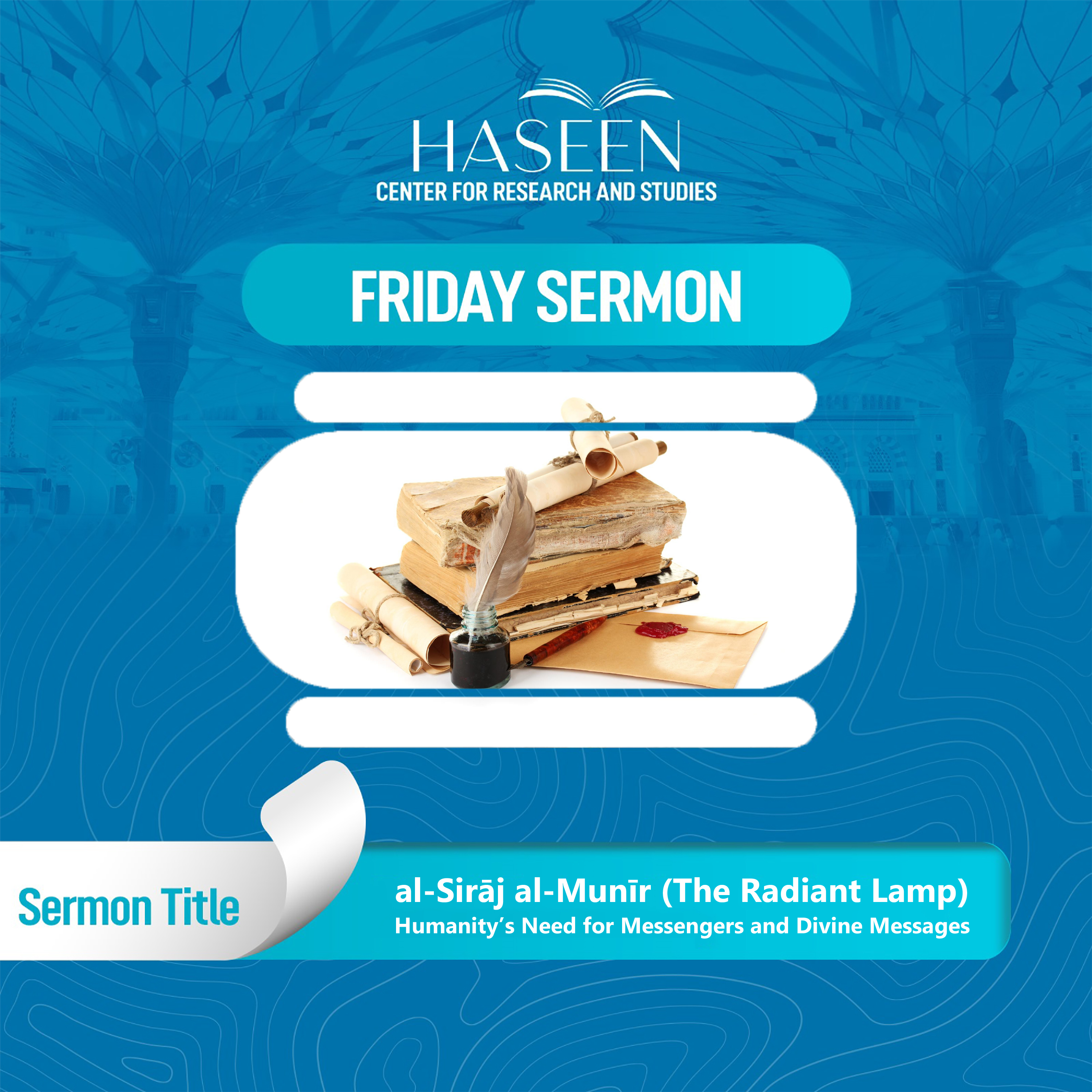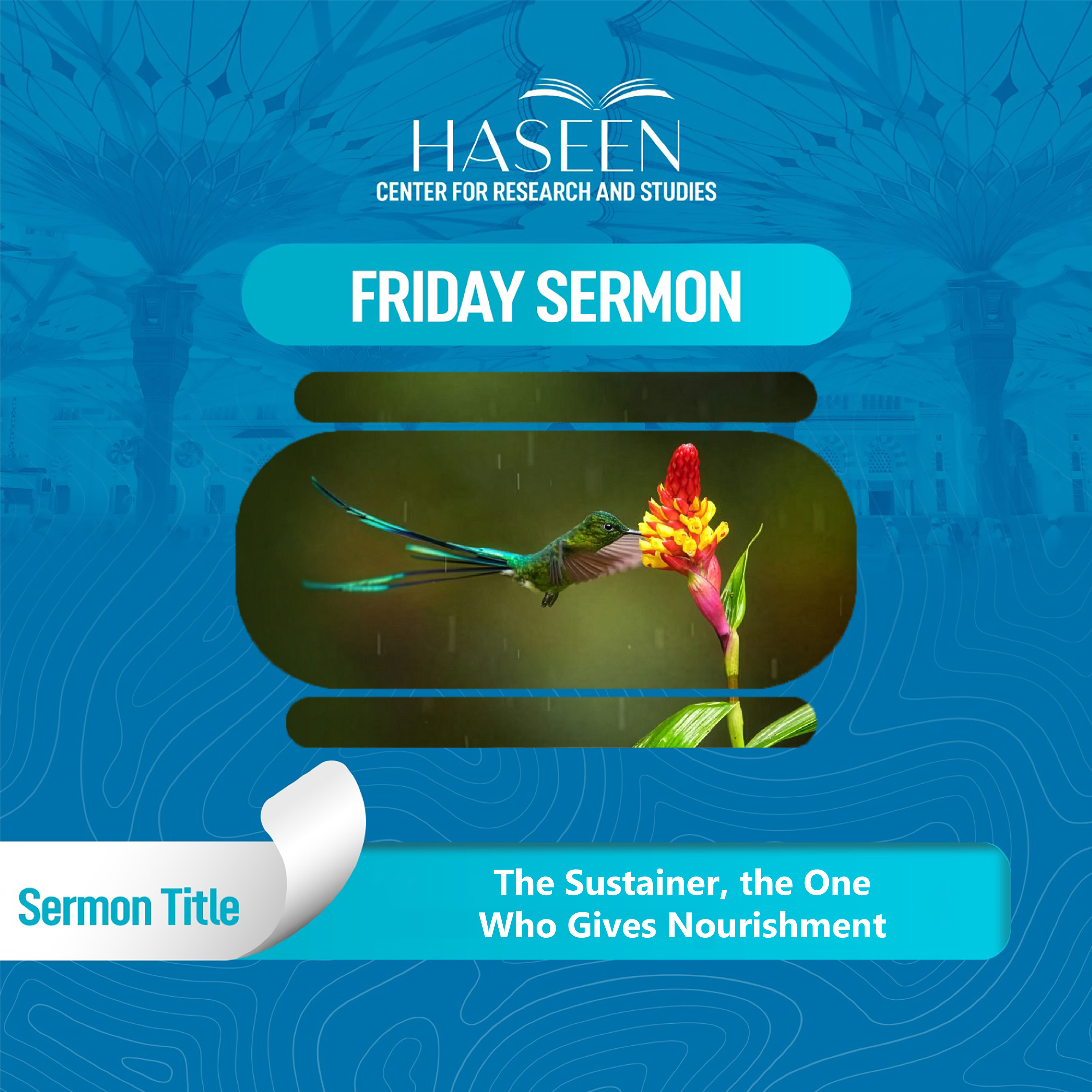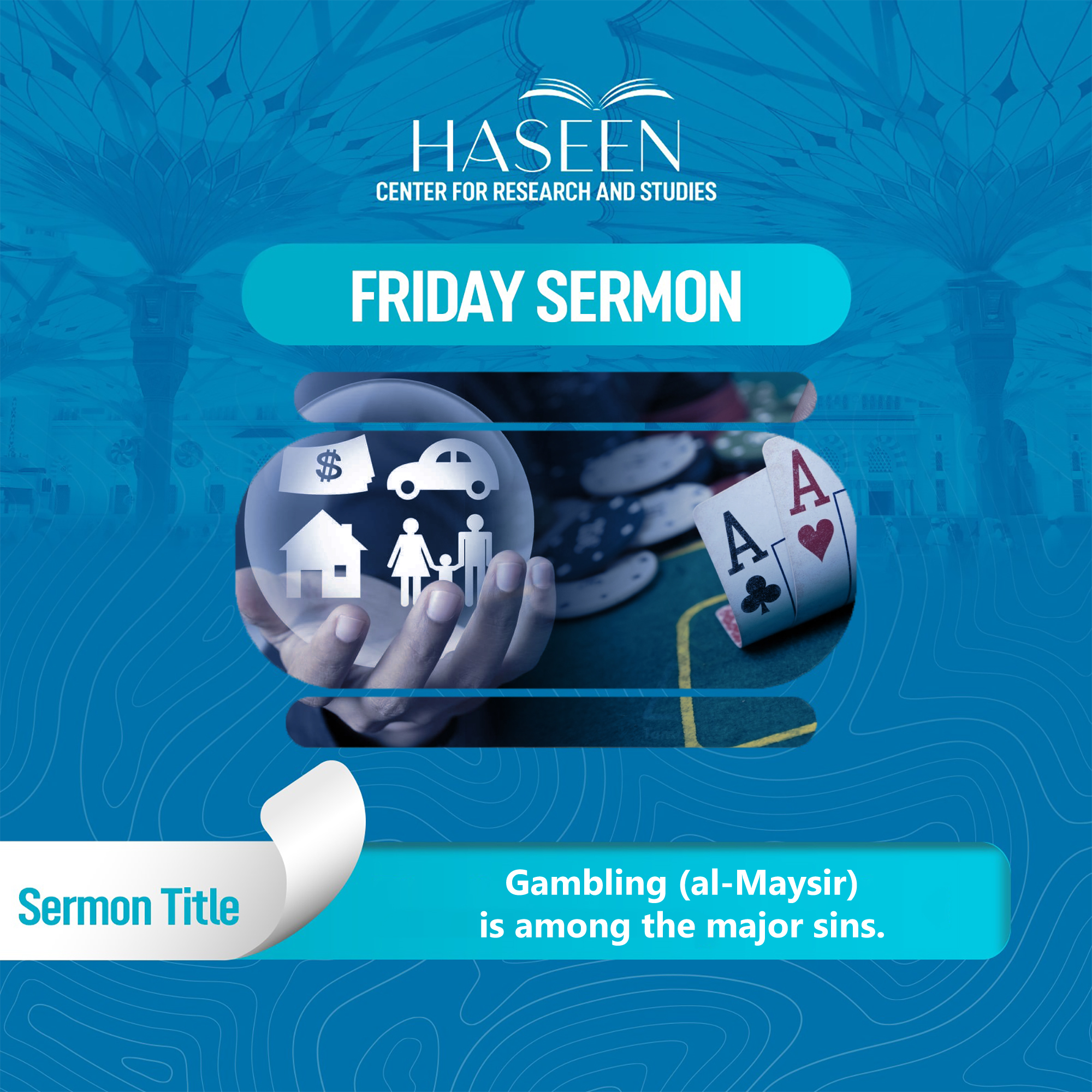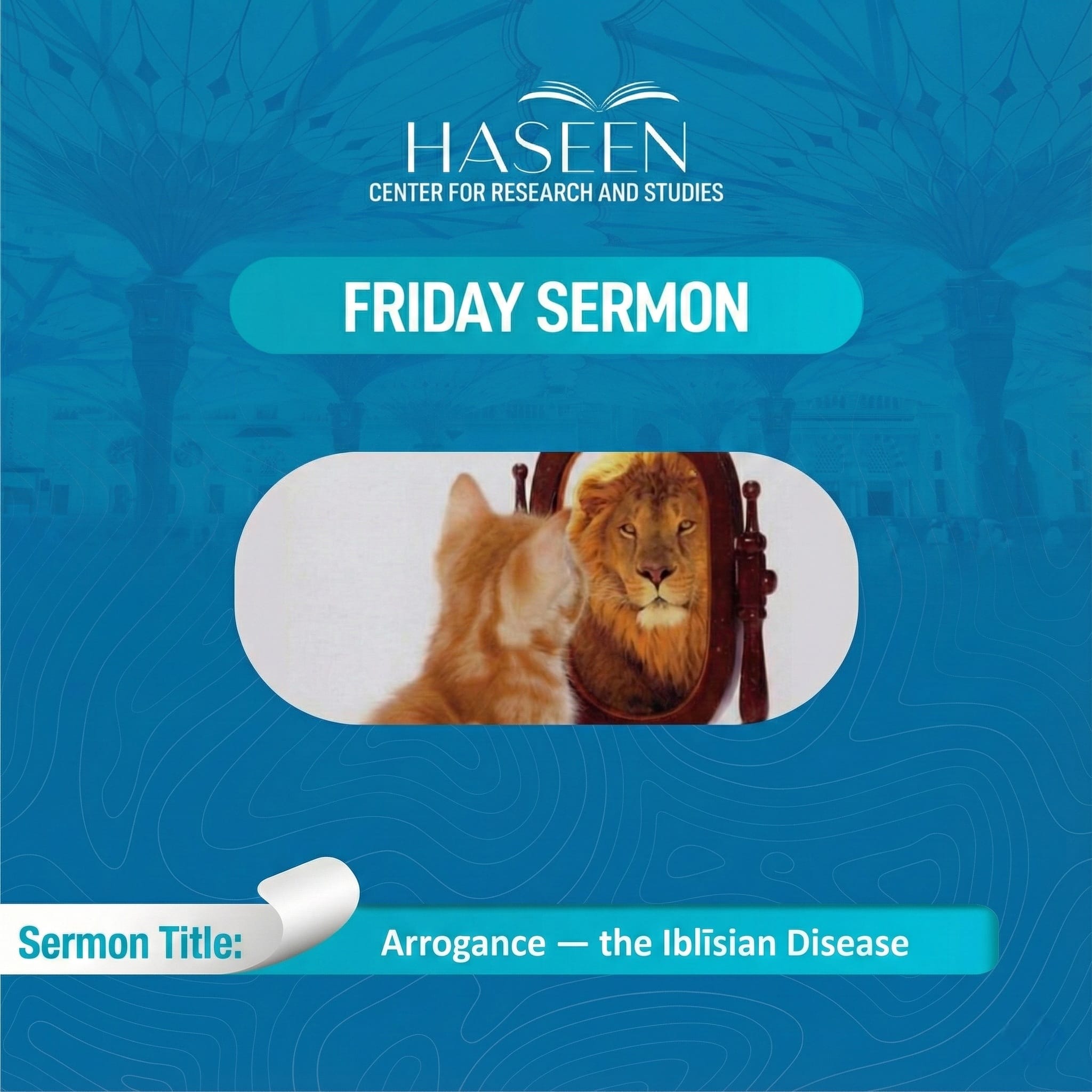Title of the Sermon: And indeed, you are of a great moral character.
Elements of the Sermon:
1. The noble character of the Prophet ﷺ.
2. The Prophet ﷺ as a practical example of the Qur'an.
3. His ﷺ qualities as proofs of his prophethood.
4. The rights of the Prophet ﷺ upon his ummah (community).
All praise be to Allah, who bestowed His grace upon the believers by sending tp them Muhammad, the truthful and trustworthy Prophet, endowed with great character. I bear witness that there is no deity worthy of worship but Allah, and I bear witness that Muhammad is His servant and Messenger. May Allah exalt and send peace to him, his family, and his companions in abundance.
To proceed:
Fear Allah, O servants of Allah, as He should be feared, and be conscious of Him in secret and in public. Allah says:
يَا أَيُّهَا الَّذِينَ آمَنُوا اتَّقُوا اللَّهَ حَقَّ تُقَاتِهِ وَلَا تَمُوتُنَّ إِلَّا وَأَنْتُمْ مُسْلِمُونَ
"O you who believe, fear Allah as He should be feared and do not die except as Muslims." (Alu-Imran:102)
Servants of Allah:
One day, a woman gifted the Prophet ﷺ a garment, saying, "O Messenger of Allah, I have woven this with my hands to clothe you in it." The Prophet ﷺ took it as he needed it and wore it. A man from among the companions saw it on him and said, "O Messenger of Allah! How beautiful is this garment; give it to me to wear." The Prophet ﷺ said, "Yes." The Prophet ﷺ returned to his home, folded it, and sent it to him. The companions, may Allah be pleased with them, reproached the man, saying, "You did not do well when you saw the Prophet ﷺ take it out of need, yet you asked him for it, knowing that he does not refuse anyone who asks him for something." The man replied, "I hoped for its blessing when the Prophet ﷺ wore it, so that I might be shrouded in it." (Reported by Al-Bukhari)
Indeed, our Prophet ﷺ was a noble Prophet, noble in rank, noble in qualities, noble in attributes.
Anas ibn Malik (may Allah be pleased with him), who served the Prophet ﷺ for ten years, spoke the truth about him when he said, "The Messenger of Allah ﷺ was the best of people, the most generous of people, and the bravest of people." (Reported by Al-Bukhari and Muslim)
His poet, Hassan ibn Thabit (may Allah be pleased with him), also spoke the truth when he said:
My eyes have never seen anyone more beautiful than you,
And no woman has ever given birth to anyone more handsome than you.
You were created free from all flaws,
As though you were created as you wished.
But above all, his Lord, who purified him and perfected his purification, spoke the truth about him when He described him, saying:
وَإِنَّكَ لَعَلَى خُلُقٍ عَظِيمٍ
"And indeed, you are of a great moral character." (Al-Qalam: 4)
Allah also spoke the truth when He described him, saying:
يَا أَيُّهَا النَّبِيُّ إِنَّا أَرْسَلْنَاكَ شَاهِدًا وَمُبَشِّرًا وَنَذِيرًا * وَدَاعِيًا إِلَى اللَّهِ بِإِذْنِهِ وَسِرَاجًا مُنِيرًا
"O Prophet, indeed We have sent you as a witness and a bringer of good tidings and a warner. And one who invites to Allah, by His permission, and an illuminating lamp." (Al-Ahzab: 45-46)
And He spoke the truth and conveyed the most eloquent description when He said:
وَمَا أَرْسَلْنَاكَ إِلَّا رَحْمَةً لِلْعَالَمِينَ
"And We have not sent you except as a mercy to the worlds." (Al-Anbiya: 107)
Indeed, he ﷺ was the most pious of people, the most devout in worship, the most ascetic, the most pious, and the most God-fearing. He was constantly in remembrance of his Lord, and the delight of his eyes was in prayer. He would weep out of fear of his Lord until his beard, his garment, and even the ground beneath him would become wet with his tears. He would stand in prayer at night until his feet became swollen, and he would say, "Should I not be a grateful servant?" (Reported by Al-Bukhari and Muslim). He ﷺ was the most eager of people to guide others, as Allah said:
لَقَدْ جَاءَكُمْ رَسُولٌ مِنْ أَنْفُسِكُمْ عَزِيزٌ عَلَيْهِ مَا عَنِتُّمْ حَرِيصٌ عَلَيْكُمْ بِالْمُؤْمِنِينَ رَءُوفٌ رَحِيمٌ
"There has certainly come to you a Messenger from among yourselves. Grievous to him is what you suffer; [he is] concerned over you and to the believers is kind and merciful." (Al-Tawbah:128)
It is not surprising for someone who strives to reform himself and benefit himself to be patient with others and endure their harm. However, it is truly remarkable for someone whose entire endeavor is to reform others, benefit them, and save them from punishment, while they harm him, threaten him, and deny him, yet he remains patient with them, merciful toward them, eager for their guidance, forgiving, and praying for them.
They wounded him one day, and he wiped the blood from his face and said, "O Allah, forgive my people, for they do not know." (Reported by Al-Bukhari)
Even on the most difficult days when they caused him great harm, the Angel of the Mountains came to him and said, "O Muhammad, if you wish, I will crush them between the two mountains." The Prophet ﷺ replied, "No, rather I hope that Allah will bring forth from their descendants those who will worship Allah alone and not associate anything with Him." (Reported by Al-Bukhari and Muslim)
At another time, Tufayl ibn Amr ad-Dawsi and his companions came to the Prophet ﷺ and said, "O Messenger of Allah, Daws has disobeyed and refused (to accept Islam), so invoke Allah against them." Some people thought that Daws was doomed, but the Prophet ﷺ said, "O Allah, guide Daws and bring them (to Islam)." (Reported by Al-Bukhari and Muslim) He was, as the Lord of the worlds said:
لَقَدْ مَنَّ اللَّهُ عَلَى الْمُؤْمِنِينَ إِذْ بَعَثَ فِيهِمْ رَسُولًا مِنْ أَنْفُسِهِمْ يَتْلُو عَلَيْهِمْ آيَاتِهِ وَيُزَكِّيهِمْ وَيُعَلِّمُهُمُ الْكِتَابَ وَالْحِكْمَةَ
"Certainly did Allah confer [great] favor upon the believers when He sent among them a Messenger from themselves, reciting to them His verses and purifying them and teaching them the Book and wisdom." (Alu-Imran: 164)
He would recite the Qur'an to the people and teach them the religion of Allah as a compassionate father teaches his children, as he used to say to his companions, "Indeed, I am like a father to you, I teach you." (Reported by Ahmad)
One of his companions spoke during prayer without knowing it was forbidden, so the Prophet ﷺ taught him in the most beautiful manner. The man said: "I have never seen a teacher before him or after him who was better in teaching than him. By Allah, he did not scold, beat, or insult me. He simply said, 'This prayer is not meant for the speech of humans; it is only for glorifying Allah, proclaiming His greatness, and reciting the Qur'an.'" (Narrated by Muslim)
He purified his companions and nurtured them, instilling faith in their hearts before teaching them the Qur'an. He endeared their Lord to them and magnified Him in their hearts. He attached their hearts to Paradise and made them fear the punishment of the Hellfire.
The Prophet ﷺ was a healer of hearts and souls. He knew their ailments and their cures, treating them with gentleness until Allah granted them healing. A young man once came to him and said, "O Messenger of Allah, permit me to commit adultery." The Prophet ﷺ drew him close and asked, "Would you like it for your mother?" The young man replied, "No, by Allah, may I be ransomed for you." The Prophet ﷺ said, "Nor do people like it for their mothers." He then asked, "Would you like it for your daughter?" The young man replied, "No, by Allah, O Messenger of Allah, may I be ransomed for you." The Prophet ﷺ said, "Nor do people like it for their daughters." He asked, "Would you like it for your sister?" The young man replied, "No, by Allah, may I be ransomed for you." The Prophet ﷺ said, "Nor do people like it for their sisters." Then, the Prophet ﷺ placed his hand on the young man and said, "O Allah, forgive his sin, purify his heart, and guard his chastity." After that, the young man never inclined towards anything sinful again." (Narrated by Ahmad)
He called upon those who committed major sins to repent and opened the door of hope for them. Once, when someone cursed a man who had been punished for drinking alcohol, saying, "May Allah disgrace you," the Prophet ﷺ said, "Do not say that. Do not assist the devil against him. Instead, say, 'May Allah have mercy on you.'" (Narrated by Al-Bukhari and Ahmad)
He was the most truthful of people in speech, the most trustworthy, and the most faithful to his promises. He never betrayed, not even his enemies. He used to say, "We will fulfill our covenant with them and seek Allah's help against them." (Narrated by Muslim)
The Prophet ﷺ was dignified and noble, radiant like the full moon, filling the eyes with awe and reverence. Amr ibn Al-As (may Allah be pleased with him) said, "There was no one more beloved to me than the Messenger of Allah ﷺ, and no one more revered in my eyes than him. I could not gaze at him directly out of respect, and if I were asked to describe him, I would not be able to, because I never fully gazed at him." (Narrated by Muslim)
He was the most eloquent of people in speech, never uttering a word that could be criticized. He was neither obscene nor vulgar, and he used to say, "The best among you are those who have the best character." (Narrated by Al-Bukhari)
He lived among them with the utmost humility, sitting as a servant sits, eating as a servant eats. He was not a king like the kings of the world; he did not distinguish himself among them by his appearance, clothing, or guards. In his home, he would mend his own shoes, patch his own clothes, and milk his own sheep. (Narrated by Al-Bukhari)
A man once came to him, trembling with fear. The Prophet ﷺ said to him, "Calm down, for I am not a king. I am only the son of a woman who used to eat dried meat." (Narrated by Ibn Majah)
He consulted his companions and accepted their opinions. He would inquire about their conditions, visit their weak, attend to their sick, grieve with them in their losses, and generously share with them, often prioritizing them over himself ﷺ. Jabir (may Allah be pleased with him) said, "The Prophet ﷺ was never asked for anything and said 'no'." (Narrated by Al-Bukhari)
He was the bravest of hearts and the strongest in his dedication to Allah's cause. No one was more zealous in defending the religion of Allah than he was. He never sought revenge for himself unless Allah's sacred boundaries were violated, in which case he would act for the sake of Allah.
He would go out with his companions for battles and fight alongside them, even ahead of them. Ali ibn Abi Talib (may Allah be pleased with him) said, "When the battle became intense and the two armies met, we would seek protection by the Messenger of Allah ﷺ, and none would be closer to the enemy than him." (Narrated by Ahmad)
He stood firm like a towering mountain, never fleeing. He declared to the polytheists, "By the One in whose hand is my soul, I will fight them upon my cause until my neck is severed, and Allah will certainly accomplish His purpose." (Narrated by Al-Bukhari)
Thus, the Prophet ﷺ was the model leader, the excellent example, of noble character, generous qualities, kind demeanor, and righteous actions.
May Allah bless you and me with the Qur'an and benefit us with the verses and wise remembrance it contains. I ask Allah for forgiveness for myself and for you; indeed, He is the Most Forgiving, Most Merciful.
The Second Sermon
All praise is due to Allah, and peace and blessings be upon the Messenger of Allah, his family, his companions, and those who follow him.
Indeed, the biography, character, and qualities of our Prophet ﷺ are among the greatest proofs of his prophethood. As you read about his noble character and beautiful attributes, your heart and soul cannot help but proclaim: "Only a prophet would act in such a manner!"
The shining lights of prophethood were evident on his face. This is what Abdullah bin Salam, who was a Jew before accepting Islam, said about him: "When the Messenger of Allah ﷺ arrived, I went to see him among the people. When I looked closely at his face, I realized that it was not the face of a liar." (Narrated by At-Tirmidhi)
Even if there were no clear signs
His mere presence would inform you of the truth.
This noble Prophet ﷺ has a great right upon us:
- We must believe in him ﷺ as a prophet and messenger, honor and revere him, and place his words above all else, not preferring any opinion, intellect, or thought over his words and judgments, nor the words of anyone else, no matter who they may be.
- We must follow his guidance, obey his commands, adopt his character, learn his biography, and love him more than we love ourselves.
- We must convey his religion, support his Sunnah, defend him, and stand by and support the believers who share our love for him, our faith in him, and our defense of his religion.
This is the path to success, as our Lord says:
فَالَّذِينَ آمَنُوا بِهِ وَعَزَّرُوهُ وَنَصَرُوهُ وَاتَّبَعُوا النُّورَ الَّذِي أُنْزِلَ مَعَهُ أُولَئِكَ هُمُ الْمُفْلِحُونَ
"So those who believe in him, honor him, support him, and follow the light that was sent down with him, it is they who will be successful." (Al-A'raf: 157)
O Allah, grant victory to Islam and honor the Muslims, and destroy the criminals. O Allah, bring tranquility to the hearts of those striving in Your cause, protect Your oppressed servants, and raise the banner of Your religion with Your strength, O Mighty, O Strong.
O Allah, guide our leader to what You love and are pleased with, and lead him by the forelock to righteousness and piety.
Our Lord, grant us good in this world and good in the Hereafter, and save us from the punishment of the Fire.


